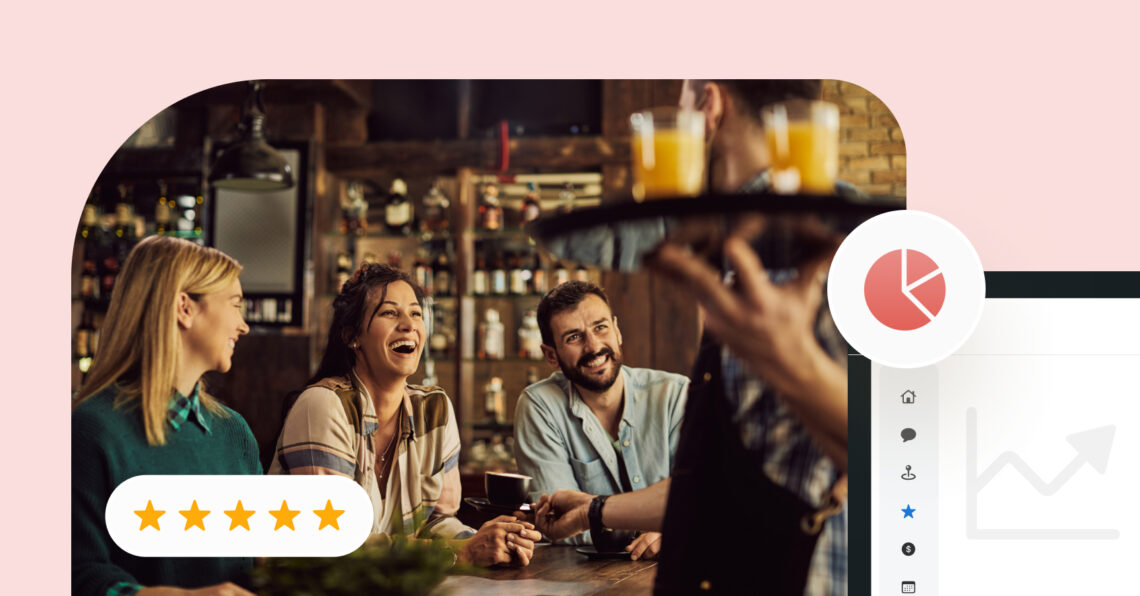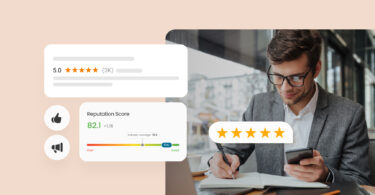Anyone can run a restaurant marketing campaign. The trick is to identify the right channel, copy, and strategy that resonates with your target audience and reaps the rewards you need. The right restaurant CRM tool eliminates the guesswork and allows businesses to turn disjointed guest data into actionable insights for personalized marketing without overwhelming your team.
However, many customer relationship management (CRM) tools fall short because they aren’t built for the restaurant industry or multi-location establishments. This leads to weaker customer relationships, inconsistent service quality, and underutilized marketing automation.
Therefore, it’s critical for your restaurant chain to invest in purpose-built restaurant CRM systems that streamline operations, help track customer behavior, and enable teams to deliver consistent, tailored experiences for every visit.
This blog post will teach you how a restaurant CRM can drive growth, what features matter most, and which tools best aid multi-location growth. We’ll also show how Birdeye, an AI company, helps leading restaurants build deeper guest relationships and smarter marketing automation through unified CRM solutions.
Table of contents
- What is a restaurant CRM system?
- Benefits of using a restaurant CRM for large enterprises
- Top 8 restaurant CRMs for your multi-location enterprise
- Key features you need in a restaurant CRM
- Bottom line: The right restaurant CRM solution is the secret sauce to success
- FAQs on restaurant CRM
- Grow your restaurant across locations with Birdeye
What is a restaurant CRM system?
A restaurant CRM system is a specialized customer relationship management tool designed to help restaurants collect, manage, and utilize guest data to enhance the dining experience and drive repeat business. It centralizes key information like customer preferences, reservation history, guest feedback, order frequency, and loyalty program activity, enabling more personalized and targeted interactions.
Unlike generic CRM software, CRM for restaurants must integrate with POS systems, reservation management, and online ordering tools to provide a full picture of every guest across all touchpoints.
For multi-location enterprises, a restaurant CRM solution ensures that all locations share a unified guest database and can create targeted local marketing campaigns based on real-time customer behavior and preferences.
Restaurant CRM solutions consolidate customer data, track guest satisfaction, and offer built-in marketing tools. They help brands deliver consistent, personalized service and improve customer satisfaction across locations.
Integrated restaurant CRM systems
Integrated restaurant CRM systems connect seamlessly with core technologies like POS systems, online ordering, table management, and reservation management to provide a 360° view of your guests and operations. Instead of managing fragmented tools, integration ensures that customer data flows between systems, enabling smarter decisions and better experiences.
These CRM solutions automatically sync data like customer preferences, order history, and visit frequency, making it easier to deliver personalized service at scale. For example, if guests typically order vegan options at one location, that insight can be used to tailor marketing campaigns or make real-time recommendations at another location.
The goal of integration is to combine operational excellence with enhanced customer satisfaction and consistent personalized service across all locations.
Types of CRM tools
Several types of CRM tools are used in the restaurant industry, each serving different business needs depending on scale, complexity, and goals. For restaurant owners and enterprise marketers, understanding these types helps in choosing the right fit:
1. Operational CRM
This system focuses on automating and optimizing day-to-day business operations, such as reservation management, POS integration, and guest feedback collection. Such tools help streamline operations and centralize guest data across touchpoints.
2. Analytical CRM
This CRM best suits businesses looking to track customer behavior, segment audiences, and uncover actionable insights from large volumes of customer data. It is also ideal for teams focused on trend forecasting, marketing automation, and performance optimization.
3. Collaborative CRM
Enables cross-functional teams like marketing, operations, and customer support to share access to unified customer profiles, enhancing customer engagement and improving overall service quality.
The best restaurant CRM systems blend these functionalities to deliver a comprehensive customer experience tailored to growing restaurant businesses.
Benefits of using a restaurant CRM for large enterprises
A well-integrated restaurant CRM system is a growth engine for multi-location enterprises. Purpose-built solutions can streamline operations, unify customer experiences, understand guest preferences, and scale marketing efforts.
Let’s explore the top benefits of using a CRM for restaurants at scale:
Understand clients effectively
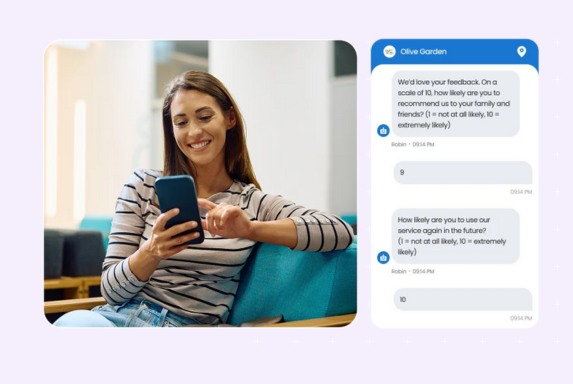
An enterprise-grade restaurant CRM software helps consolidate customer data across locations into a single source of truth. This means you can:
- Track customer behavior patterns such as visit frequency, spend levels, and order preferences.
- Map dining preferences to personalize future service.
- Access guest feedback across channels to identify operational blind spots and secure loyal customers.
- Analyze sales trends to inform menu, pricing, and marketing decisions.
With detailed guest data and built-in analytics tools, you can gain valuable insights into anticipating needs and creating experiences that exceed expectations.
Improve guest engagement
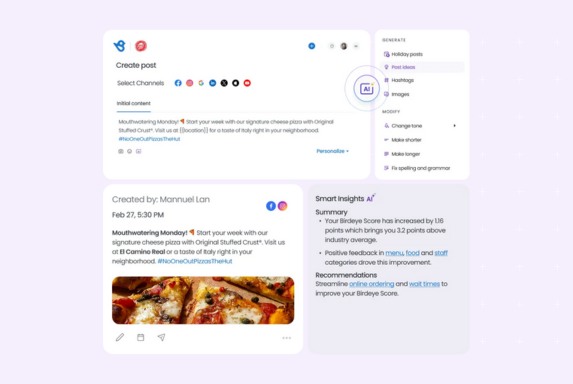
Restaurants can significantly improve their customer relationship management efforts by devising methods to turn customer data from surveys, reviews, and internal processes into actionable insights for personalized engagement. A robust restaurant CRM solution enables:
- Targeted marketing campaigns via email, SMS, social media, or app based on location, order history, and guest preferences.
- Automate follow-ups post-visit or after a negative review to recover experiences and boost satisfaction.
- Personalized service across channels—online and in-person.
- Real-time cross-selling opportunities using past behavior and customer habits.
The result? Higher guest engagement, better customer satisfaction, and stronger customer relationships.
Analyze restaurant performance
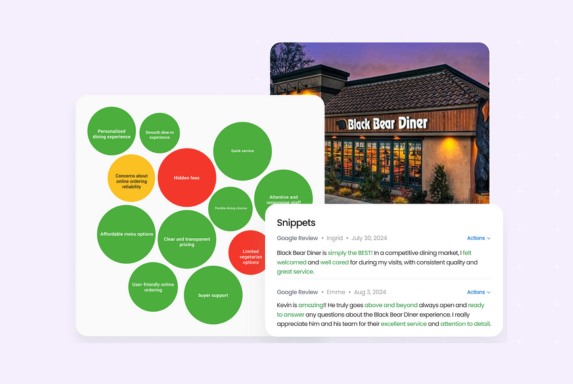
A powerful CRM system can be a strategic tool for decision-makers. Use it to:
- Benchmark across locations with built-in competitive insights.
- Conduct market analysis and uncover high-performing customer segments
- Identify gaps in guest satisfaction or service delivery.
- Monitor campaign effectiveness and run A/B tests on promotions to adjust marketing automation strategies.
This level of analysis helps CMOs and regional leaders tie CRM data directly to business outcomes.
"Using Insights, within 12 months, Blaze Pizza held a consistent 4.3 overall rating with 2x more locations and 175% more reviews, stayed in tune with daily customer feedback at a national and franchise level, and expanded faster than all other fast-casual pizza chains." - Blaze Pizza Team
Boost retention rates and guest relationships
Your restaurant can increase repeat business with better customer engagement, smarter campaigns, and more personalized service. Here’s how CRM helps in this endeavor:
- Strengthens guest relationships by making every visit feel personal.
- Supports customer loyalty programs that reward valuable behavior.
- Helps retain customers with proactive communication and service quality.
Now that we know how critical CRM tools can be for your restaurant, let’s check out the top solutions in the industry.
Top 8 restaurant CRMs for your multi-location enterprise
Finding the best restaurant CRM means choosing a system that fits your scale, integrates with your tech stack, and helps you deepen customer relationships across every location. Here’s a look at the top tools used by leading restaurants:
Birdeye
Birdeye is an AI-driven CRM for restaurants designed for multi-location enterprises. It allows them to manage guest feedback, online ordering, restaurant reviews, and marketing automation in one place.
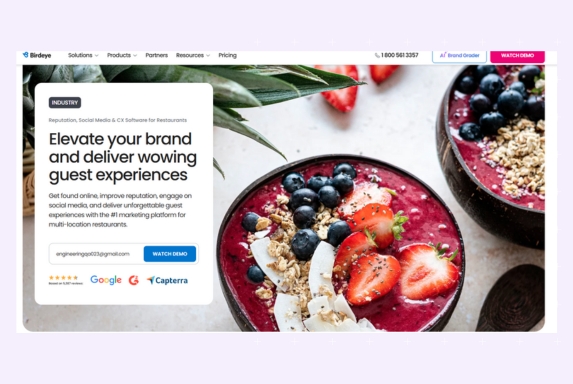
Key features:
- Unified guest data across locations
- AI-generated targeted marketing campaigns
- Automated review requests and AI-based responses, insights, and marketing features
- Seamless integrations with POS systems and third-party platforms
- Local content marketing across Google Business Profile and social media channels
Pros: Powerful analytics, built-in AI, and multi-location scalability
Cons: May be advanced for single-location restaurants
Best for: Enterprises focused on retention, guest engagement, and scalable customer relationship management
“Our brand has 130 locations and many moving parts – The team at BirdEye is responsive, thinking 3 steps ahead, and able to assist in many ways. What I like best is the team I get to work with! BirdEye is the perfect tool that allows us to get a perspective on how our guests feel about our brand, which is vital to our success. That being said, we pull data on a weekly and bi-weekly basis that is shared with our teams in the field. This data represents areas where we can improve – operationally, training, and our brand culture.”
– Denise D’Amico Johnson, Black Bear Diner
SevenRooms
SevenRooms is a popular restaurant CRM solution with robust tools for customer data capture, marketing automation, and loyalty.
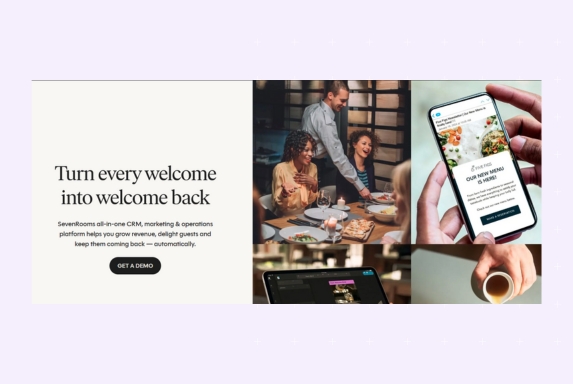
Key features:
- Guest profile enrichment via POS and booking platforms
- Targeted marketing campaigns with built-in automation
- Custom loyalty programs and feedback capture
Pros: End-to-end guest journey tracking, deep personalization
Cons: Pricing can be high for smaller operators
Best for: Upscale restaurants and hospitality groups focused on guest relationships
OpenTable
Best known for reservations, OpenTable solution also includes light CRM features for restaurants that need guest tracking and retention features.
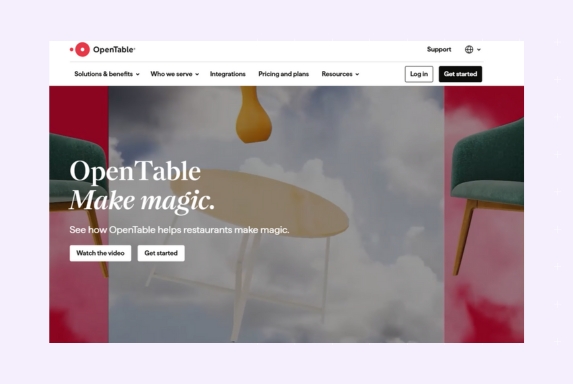
Key features:
- Reservation and waitlist management
- Guest tagging and visit frequency
- Basic email marketing tools
Pros: Large diner network, easy guest insights
Cons: Limited marketing automation features
Best for: Casual restaurants wanting a simple CRM tied to bookings
Toast
Toast is a full restaurant OS with integrated restaurant CRM software through its point of sales solution.
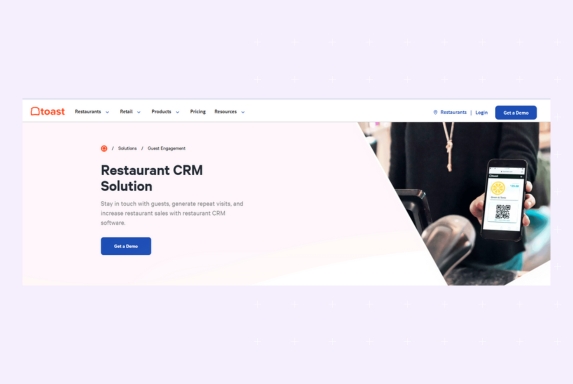
Key features:
- Built-in loyalty programs and marketing suite
- Order history and guest data collection
- Automated email campaigns and online ordering sync
Pros: Seamless POS integration, end-to-end view of operations
Cons: Less customizable than dedicated CRM tools
Best for: Fast-casual and QSR brands needing unified restaurant operations
Resy
Acquired by American Express, Resy is a CRM solution focusing on features like reservations and customer engagement.
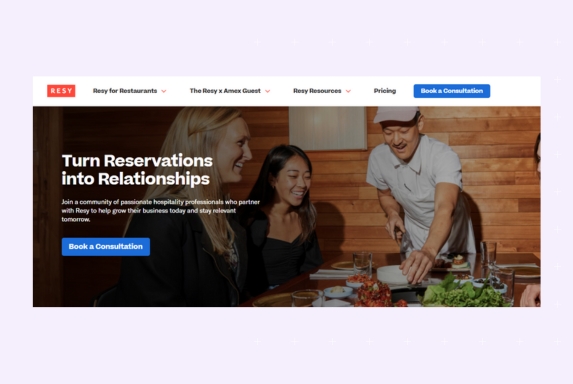
Key features:
- Guest database and dining history
- Waitlist management and notifications
- Light CRM tagging and notes
Pros: UX-friendly, strong brand reputation
Cons: Limited reporting and automation
Best for: Niche restaurants focused on exclusive experiences
HubSpot
A well-known CRM system with customizable pipelines, HubSpot helps restaurants organize leads, track customer interactions, and automate marketing workflows.
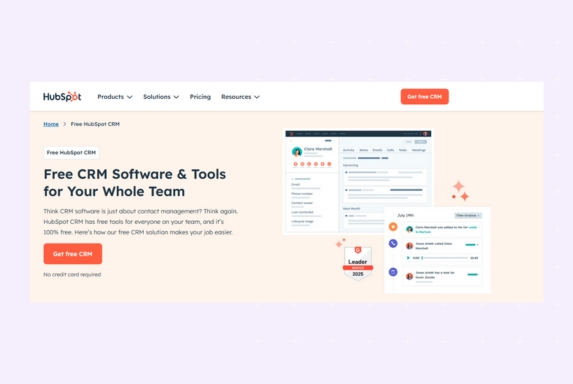
Key features:
- Contact segmentation and list building
- Email, SMS, and social media automation
- Dashboard for campaign performance
Pros: Scalable, flexible, user-friendly
Cons: Requires high customization for restaurant-specific workflows
Best for: Groups with in-house marketing teams needing control
Zoho
Zoho CRM offers end-to-end customer relationship management CRM tools with deep customization and integrations.

Key features:
- Lead and contact management
- Workflow automation
- Email campaign tracking
Pros: Affordable, customizable, strong mobile app
Cons: Can be overwhelming for smaller teams
Best for: Mid-size restaurant groups seeking value and flexibility
Salesforce
Salesforce is an enterprise-grade CRM solution hospitality brands can use to unify customer data, personalize service, and automate marketing at scale.
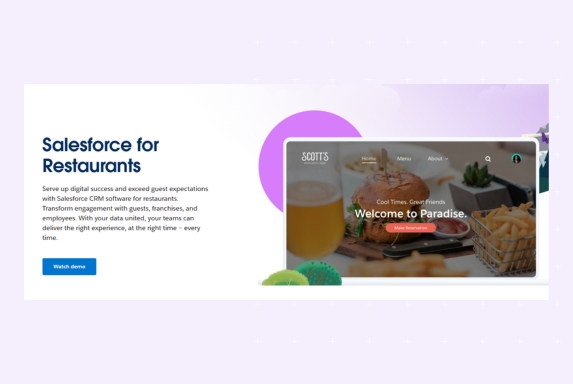
Key features:
- Advanced data modeling and AI-driven insights
- Multi-channel automation and personalization
- Integration with loyalty and ordering platforms
Pros: Industry-leading power and customizability
Cons: High complexity and cost
Best for: Enterprise restaurants with dedicated IT and marketing teams
Key features you need in a restaurant CRM
Choosing the best restaurant CRM isn’t just about brand names—it’s about ensuring the platform aligns with your operational goals, tech stack, and guest experience strategy. Here are the essential features every CRM restaurant system should have:
- Centralized customer data: Unify guest data from all locations, POS systems, online ordering, and reservation management tools to get a complete view of your customers.
- Marketing automation tools: Run targeted marketing campaigns based on customer behavior, frequency, spend, and dining preferences to increase repeat business.
- Loyalty program integration: Build or sync loyalty programs that drive visits, encourage upsells, and boost guest retention across locations.
- Guest feedback and review management: Gather valuable guest feedback to understand customer satisfaction rates and resolve issues in real time.
- Personalization engine: Deliver personalized service at scale using guest profiles, notes, and customer preferences to exceed guest expectations.
- Seamless integrations: Connect effortlessly with your existing tools across POS systems, reservation platforms, and third-party apps.
- Analytics and performance insights: Access actionable insights into campaign performance, sales trends, and guest behavior to improve restaurant management efficiency.
- Multi-location capabilities: Ensure the system can scale with your brand, support multi-unit visibility, and offer role-based access for location-specific teams.
Bottom line: The right restaurant CRM solution is the secret sauce to success
For multi-location restaurants, managing customer relationships at scale requires a purpose-built system that turns disconnected guest data into a single source of truth. This fuels personalized service, smarter marketing automation, and improved customer satisfaction.
While generic CRMs fall short, tools built specifically for the restaurant industry empower brands to deepen guest relationships, drive repeat business, and streamline day-to-day operations.
Whether you’re looking to improve loyalty, centralize insights, or boost performance, a modern CRM system is your growth engine, and platforms like Birdeye help you power it with AI precision.
FAQs on restaurant CRM
Service CRM helps manage customer interactions, resolve issues, and improve guest satisfaction. Sales CRM drives revenue through lead tracking, upsells, and marketing campaigns. Together, they support both engagement and growth.
A restaurant CRM system collects and organizes guest data, such as order history, preferences, and feedback. It helps restaurants deliver personalized service, run targeted marketing campaigns, and build customer loyalty.
CRM helps streamline operations by integrating with POS and reservation tools. It centralizes customer data, automates communication, and enables smarter decisions based on guest behavior and trends.
Yes, even small restaurants benefit from CRM by understanding their regulars, improving service, and increasing repeat business. Scalable CRM solutions are available at lower costs with essential features.
Yes. A good CRM system integrates with online ordering platforms, captures order data, and uses it for follow-ups, loyalty programs, and personalized marketing to boost retention.
Grow your restaurant across locations with Birdeye
Scaling a restaurant brand requires more than great food—it demands smarter tools to manage guest experiences, streamline marketing, and drive repeat visits across every location. That’s where Birdeye, the premier AI platform for restaurants, delivers.
Birdeye empowers restaurant owners and enterprise teams to grow faster with purpose-built tools for:
- AI-powered reviews: Generate and respond to reviews at scale while improving customer satisfaction.
- Listings management: Keep location info accurate across 150+ platforms to boost visibility.
- Social media management: Schedule and publish posts, track engagement, and stay on-brand everywhere.
- AI Insights: Uncover guest behavior trends, sentiment, and actionable insights from feedback and interactions.
- AI Competitive analysis: Benchmark guest experiences against nearby restaurants and uncover new growth opportunities.
Ready to boost loyalty, visibility, and performance? Book a free demo and see how Birdeye helps multi-location restaurants deliver standout experiences at scale.

Originally published
